Cultivating Social Intelligence: A Cross-Cultural Perspective
VerifiedAdded on 2019/12/18
|12
|4167
|184
Literature Review
AI Summary
The concept of social intelligence competencies in a cross-cultural context is crucial for effective communication, collaboration and leadership. This summary reviews various studies that highlight the importance of considering cultural differences when developing these competencies. Hofstede's doctrine on culture and value orientations is discussed, as well as the impact of doing and mastery orientations on relationships among justice, commitment, and trust. Cross-cultural competence assessment tools are also reviewed. The significance of cross-cultural training in expatriate adjustment and its relationship with cultural intelligence and self-efficacy is explored. The papers examined demonstrate that understanding social intelligence competencies requires consideration of cultural nuances, and that building trust on cross-cultural teams is essential for success.
Contribute Materials
Your contribution can guide someone’s learning journey. Share your
documents today.

CROSS CULTURE
MANAGEMENT
MANAGEMENT
Secure Best Marks with AI Grader
Need help grading? Try our AI Grader for instant feedback on your assignments.
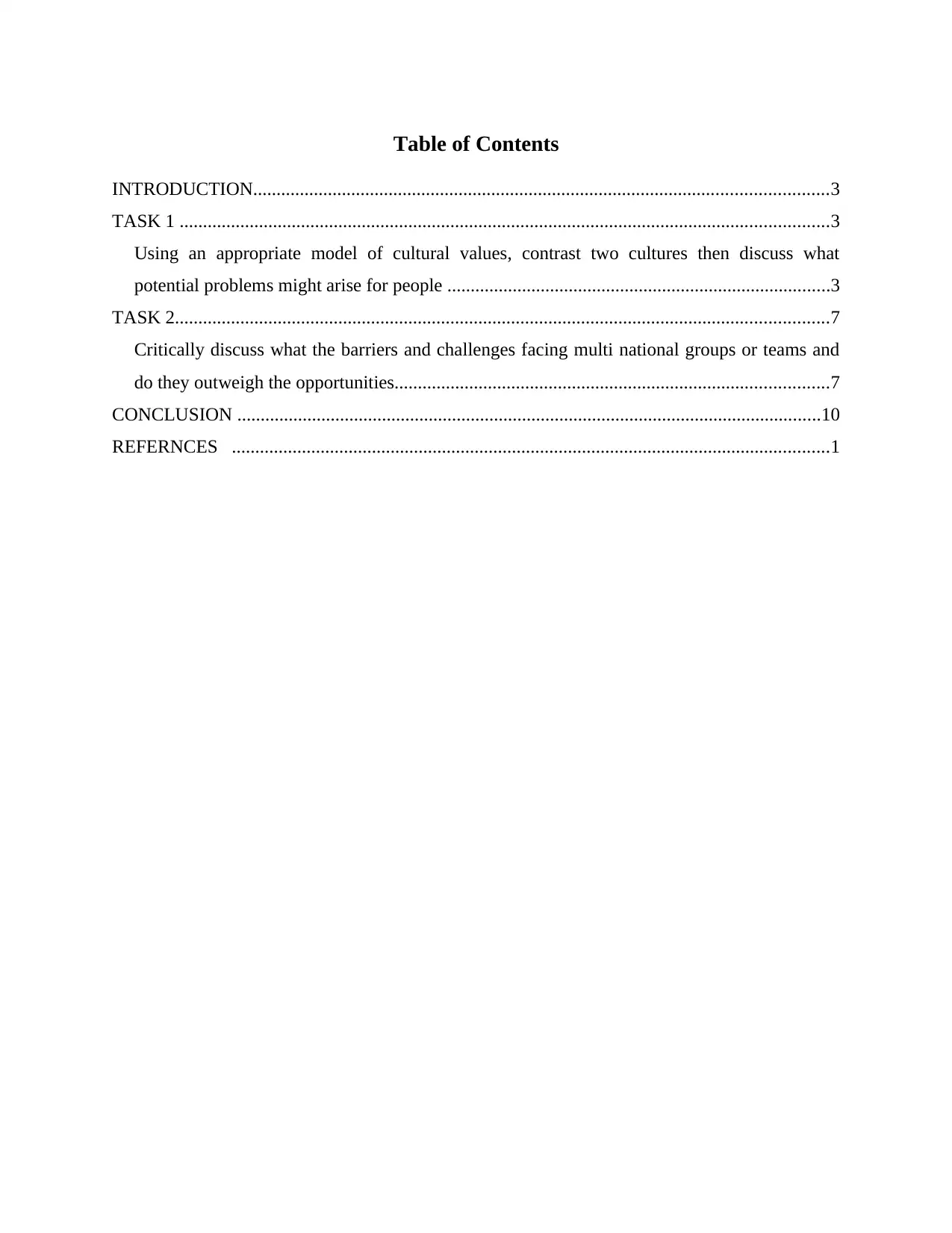
Table of Contents
INTRODUCTION...........................................................................................................................3
TASK 1 ...........................................................................................................................................3
Using an appropriate model of cultural values, contrast two cultures then discuss what
potential problems might arise for people ..................................................................................3
TASK 2............................................................................................................................................7
Critically discuss what the barriers and challenges facing multi national groups or teams and
do they outweigh the opportunities.............................................................................................7
CONCLUSION .............................................................................................................................10
REFERNCES ................................................................................................................................1
INTRODUCTION...........................................................................................................................3
TASK 1 ...........................................................................................................................................3
Using an appropriate model of cultural values, contrast two cultures then discuss what
potential problems might arise for people ..................................................................................3
TASK 2............................................................................................................................................7
Critically discuss what the barriers and challenges facing multi national groups or teams and
do they outweigh the opportunities.............................................................................................7
CONCLUSION .............................................................................................................................10
REFERNCES ................................................................................................................................1
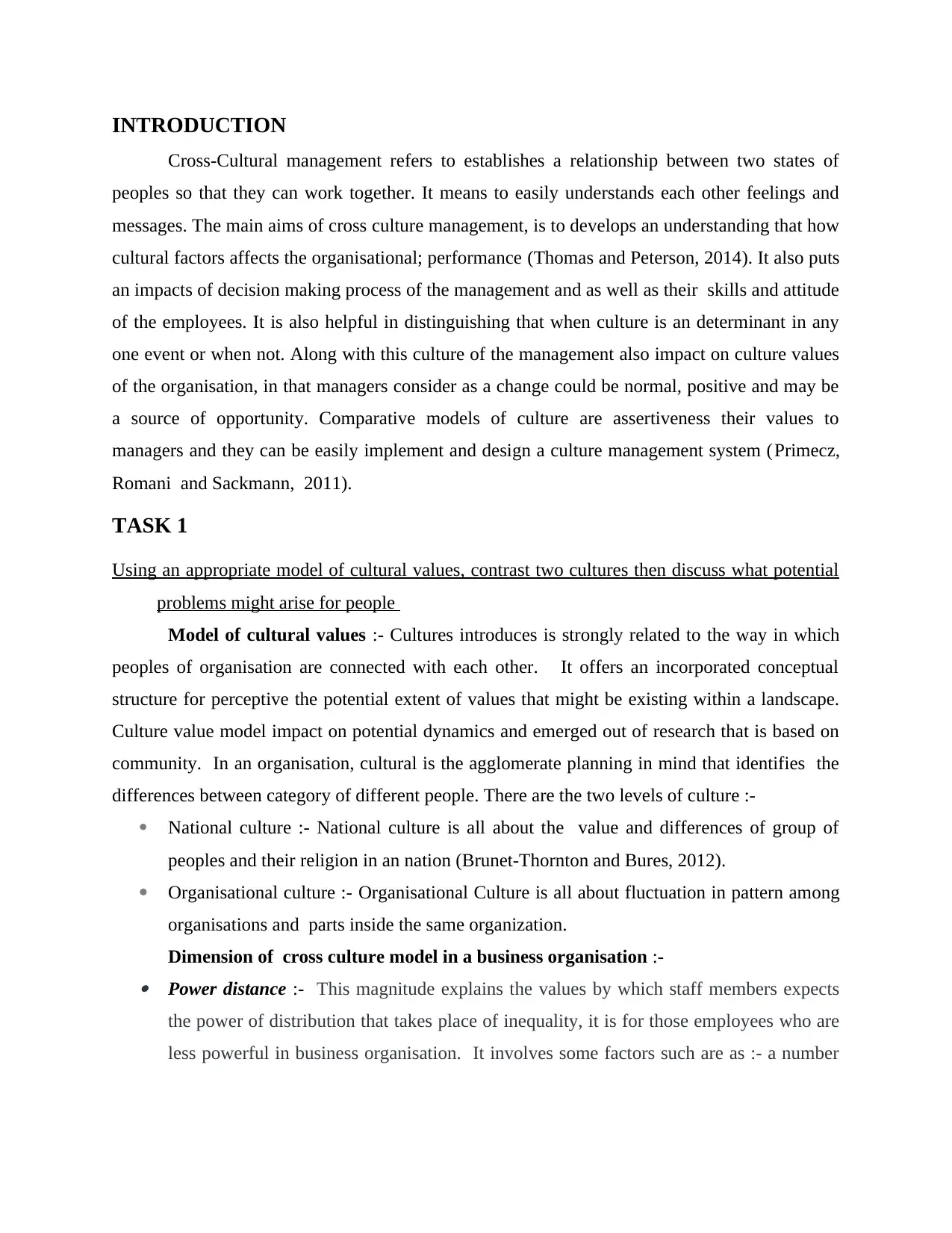
INTRODUCTION
Cross-Cultural management refers to establishes a relationship between two states of
peoples so that they can work together. It means to easily understands each other feelings and
messages. The main aims of cross culture management, is to develops an understanding that how
cultural factors affects the organisational; performance (Thomas and Peterson, 2014). It also puts
an impacts of decision making process of the management and as well as their skills and attitude
of the employees. It is also helpful in distinguishing that when culture is an determinant in any
one event or when not. Along with this culture of the management also impact on culture values
of the organisation, in that managers consider as a change could be normal, positive and may be
a source of opportunity. Comparative models of culture are assertiveness their values to
managers and they can be easily implement and design a culture management system (Primecz,
Romani and Sackmann, 2011).
TASK 1
Using an appropriate model of cultural values, contrast two cultures then discuss what potential
problems might arise for people
Model of cultural values :- Cultures introduces is strongly related to the way in which
peoples of organisation are connected with each other. It offers an incorporated conceptual
structure for perceptive the potential extent of values that might be existing within a landscape.
Culture value model impact on potential dynamics and emerged out of research that is based on
community. In an organisation, cultural is the agglomerate planning in mind that identifies the
differences between category of different people. There are the two levels of culture :-
National culture :- National culture is all about the value and differences of group of
peoples and their religion in an nation (Brunet-Thornton and Bures, 2012).
Organisational culture :- Organisational Culture is all about fluctuation in pattern among
organisations and parts inside the same organization.
Dimension of cross culture model in a business organisation :- Power distance :- This magnitude explains the values by which staff members expects
the power of distribution that takes place of inequality, it is for those employees who are
less powerful in business organisation. It involves some factors such are as :- a number
Cross-Cultural management refers to establishes a relationship between two states of
peoples so that they can work together. It means to easily understands each other feelings and
messages. The main aims of cross culture management, is to develops an understanding that how
cultural factors affects the organisational; performance (Thomas and Peterson, 2014). It also puts
an impacts of decision making process of the management and as well as their skills and attitude
of the employees. It is also helpful in distinguishing that when culture is an determinant in any
one event or when not. Along with this culture of the management also impact on culture values
of the organisation, in that managers consider as a change could be normal, positive and may be
a source of opportunity. Comparative models of culture are assertiveness their values to
managers and they can be easily implement and design a culture management system (Primecz,
Romani and Sackmann, 2011).
TASK 1
Using an appropriate model of cultural values, contrast two cultures then discuss what potential
problems might arise for people
Model of cultural values :- Cultures introduces is strongly related to the way in which
peoples of organisation are connected with each other. It offers an incorporated conceptual
structure for perceptive the potential extent of values that might be existing within a landscape.
Culture value model impact on potential dynamics and emerged out of research that is based on
community. In an organisation, cultural is the agglomerate planning in mind that identifies the
differences between category of different people. There are the two levels of culture :-
National culture :- National culture is all about the value and differences of group of
peoples and their religion in an nation (Brunet-Thornton and Bures, 2012).
Organisational culture :- Organisational Culture is all about fluctuation in pattern among
organisations and parts inside the same organization.
Dimension of cross culture model in a business organisation :- Power distance :- This magnitude explains the values by which staff members expects
the power of distribution that takes place of inequality, it is for those employees who are
less powerful in business organisation. It involves some factors such are as :- a number
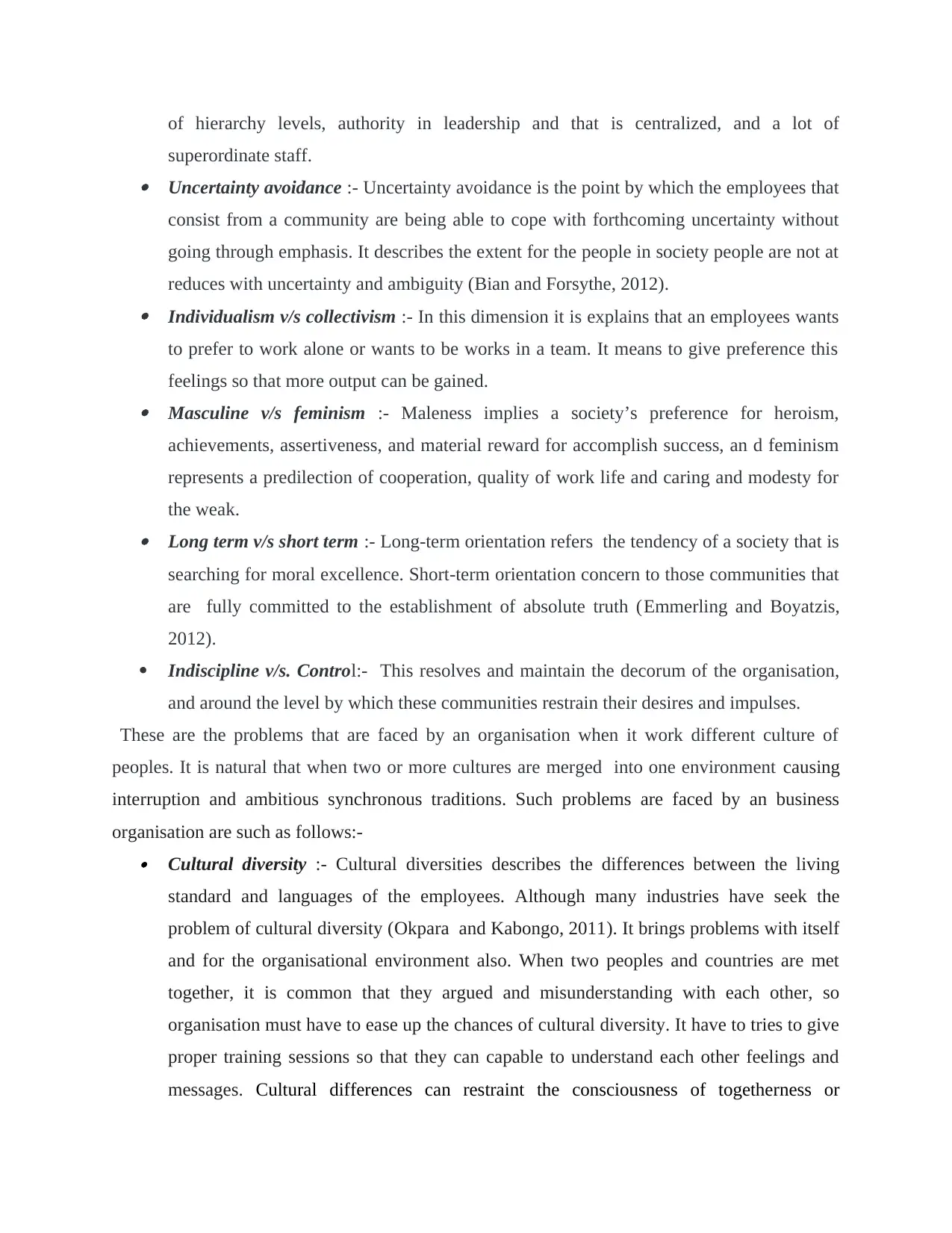
of hierarchy levels, authority in leadership and that is centralized, and a lot of
superordinate staff. Uncertainty avoidance :- Uncertainty avoidance is the point by which the employees that
consist from a community are being able to cope with forthcoming uncertainty without
going through emphasis. It describes the extent for the people in society people are not at
reduces with uncertainty and ambiguity (Bian and Forsythe, 2012). Individualism v/s collectivism :- In this dimension it is explains that an employees wants
to prefer to work alone or wants to be works in a team. It means to give preference this
feelings so that more output can be gained. Masculine v/s feminism :- Maleness implies a society’s preference for heroism,
achievements, assertiveness, and material reward for accomplish success, an d feminism
represents a predilection of cooperation, quality of work life and caring and modesty for
the weak. Long term v/s short term :- Long-term orientation refers the tendency of a society that is
searching for moral excellence. Short-term orientation concern to those communities that
are fully committed to the establishment of absolute truth (Emmerling and Boyatzis,
2012).
Indiscipline v/s. Control:- This resolves and maintain the decorum of the organisation,
and around the level by which these communities restrain their desires and impulses.
These are the problems that are faced by an organisation when it work different culture of
peoples. It is natural that when two or more cultures are merged into one environment causing
interruption and ambitious synchronous traditions. Such problems are faced by an business
organisation are such as follows:- Cultural diversity :- Cultural diversities describes the differences between the living
standard and languages of the employees. Although many industries have seek the
problem of cultural diversity (Okpara and Kabongo, 2011). It brings problems with itself
and for the organisational environment also. When two peoples and countries are met
together, it is common that they argued and misunderstanding with each other, so
organisation must have to ease up the chances of cultural diversity. It have to tries to give
proper training sessions so that they can capable to understand each other feelings and
messages. Cultural differences can restraint the consciousness of togetherness or
superordinate staff. Uncertainty avoidance :- Uncertainty avoidance is the point by which the employees that
consist from a community are being able to cope with forthcoming uncertainty without
going through emphasis. It describes the extent for the people in society people are not at
reduces with uncertainty and ambiguity (Bian and Forsythe, 2012). Individualism v/s collectivism :- In this dimension it is explains that an employees wants
to prefer to work alone or wants to be works in a team. It means to give preference this
feelings so that more output can be gained. Masculine v/s feminism :- Maleness implies a society’s preference for heroism,
achievements, assertiveness, and material reward for accomplish success, an d feminism
represents a predilection of cooperation, quality of work life and caring and modesty for
the weak. Long term v/s short term :- Long-term orientation refers the tendency of a society that is
searching for moral excellence. Short-term orientation concern to those communities that
are fully committed to the establishment of absolute truth (Emmerling and Boyatzis,
2012).
Indiscipline v/s. Control:- This resolves and maintain the decorum of the organisation,
and around the level by which these communities restrain their desires and impulses.
These are the problems that are faced by an organisation when it work different culture of
peoples. It is natural that when two or more cultures are merged into one environment causing
interruption and ambitious synchronous traditions. Such problems are faced by an business
organisation are such as follows:- Cultural diversity :- Cultural diversities describes the differences between the living
standard and languages of the employees. Although many industries have seek the
problem of cultural diversity (Okpara and Kabongo, 2011). It brings problems with itself
and for the organisational environment also. When two peoples and countries are met
together, it is common that they argued and misunderstanding with each other, so
organisation must have to ease up the chances of cultural diversity. It have to tries to give
proper training sessions so that they can capable to understand each other feelings and
messages. Cultural differences can restraint the consciousness of togetherness or
Secure Best Marks with AI Grader
Need help grading? Try our AI Grader for instant feedback on your assignments.
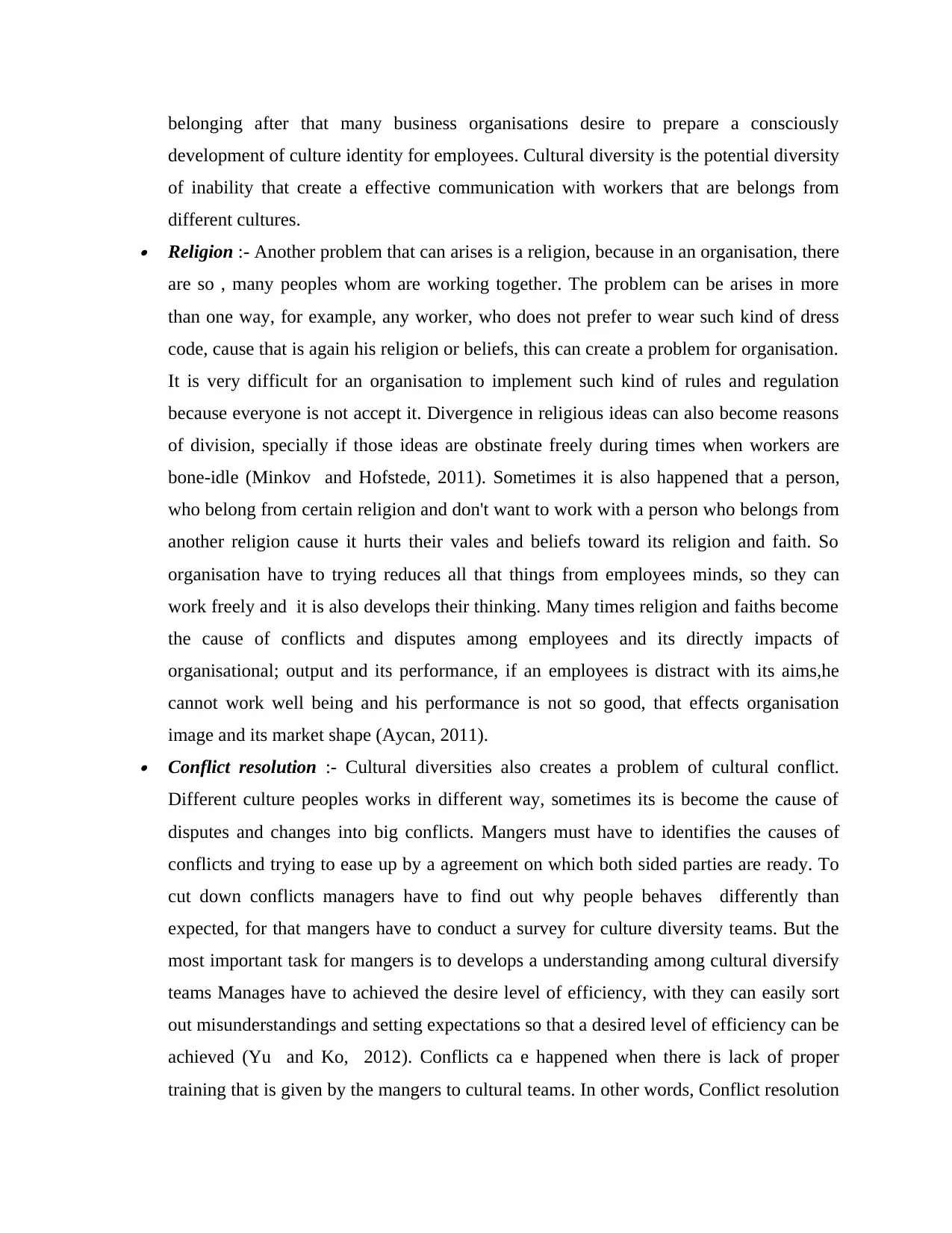
belonging after that many business organisations desire to prepare a consciously
development of culture identity for employees. Cultural diversity is the potential diversity
of inability that create a effective communication with workers that are belongs from
different cultures. Religion :- Another problem that can arises is a religion, because in an organisation, there
are so , many peoples whom are working together. The problem can be arises in more
than one way, for example, any worker, who does not prefer to wear such kind of dress
code, cause that is again his religion or beliefs, this can create a problem for organisation.
It is very difficult for an organisation to implement such kind of rules and regulation
because everyone is not accept it. Divergence in religious ideas can also become reasons
of division, specially if those ideas are obstinate freely during times when workers are
bone-idle (Minkov and Hofstede, 2011). Sometimes it is also happened that a person,
who belong from certain religion and don't want to work with a person who belongs from
another religion cause it hurts their vales and beliefs toward its religion and faith. So
organisation have to trying reduces all that things from employees minds, so they can
work freely and it is also develops their thinking. Many times religion and faiths become
the cause of conflicts and disputes among employees and its directly impacts of
organisational; output and its performance, if an employees is distract with its aims,he
cannot work well being and his performance is not so good, that effects organisation
image and its market shape (Aycan, 2011). Conflict resolution :- Cultural diversities also creates a problem of cultural conflict.
Different culture peoples works in different way, sometimes its is become the cause of
disputes and changes into big conflicts. Mangers must have to identifies the causes of
conflicts and trying to ease up by a agreement on which both sided parties are ready. To
cut down conflicts managers have to find out why people behaves differently than
expected, for that mangers have to conduct a survey for culture diversity teams. But the
most important task for mangers is to develops a understanding among cultural diversify
teams Manages have to achieved the desire level of efficiency, with they can easily sort
out misunderstandings and setting expectations so that a desired level of efficiency can be
achieved (Yu and Ko, 2012). Conflicts ca e happened when there is lack of proper
training that is given by the mangers to cultural teams. In other words, Conflict resolution
development of culture identity for employees. Cultural diversity is the potential diversity
of inability that create a effective communication with workers that are belongs from
different cultures. Religion :- Another problem that can arises is a religion, because in an organisation, there
are so , many peoples whom are working together. The problem can be arises in more
than one way, for example, any worker, who does not prefer to wear such kind of dress
code, cause that is again his religion or beliefs, this can create a problem for organisation.
It is very difficult for an organisation to implement such kind of rules and regulation
because everyone is not accept it. Divergence in religious ideas can also become reasons
of division, specially if those ideas are obstinate freely during times when workers are
bone-idle (Minkov and Hofstede, 2011). Sometimes it is also happened that a person,
who belong from certain religion and don't want to work with a person who belongs from
another religion cause it hurts their vales and beliefs toward its religion and faith. So
organisation have to trying reduces all that things from employees minds, so they can
work freely and it is also develops their thinking. Many times religion and faiths become
the cause of conflicts and disputes among employees and its directly impacts of
organisational; output and its performance, if an employees is distract with its aims,he
cannot work well being and his performance is not so good, that effects organisation
image and its market shape (Aycan, 2011). Conflict resolution :- Cultural diversities also creates a problem of cultural conflict.
Different culture peoples works in different way, sometimes its is become the cause of
disputes and changes into big conflicts. Mangers must have to identifies the causes of
conflicts and trying to ease up by a agreement on which both sided parties are ready. To
cut down conflicts managers have to find out why people behaves differently than
expected, for that mangers have to conduct a survey for culture diversity teams. But the
most important task for mangers is to develops a understanding among cultural diversify
teams Manages have to achieved the desire level of efficiency, with they can easily sort
out misunderstandings and setting expectations so that a desired level of efficiency can be
achieved (Yu and Ko, 2012). Conflicts ca e happened when there is lack of proper
training that is given by the mangers to cultural teams. In other words, Conflict resolution
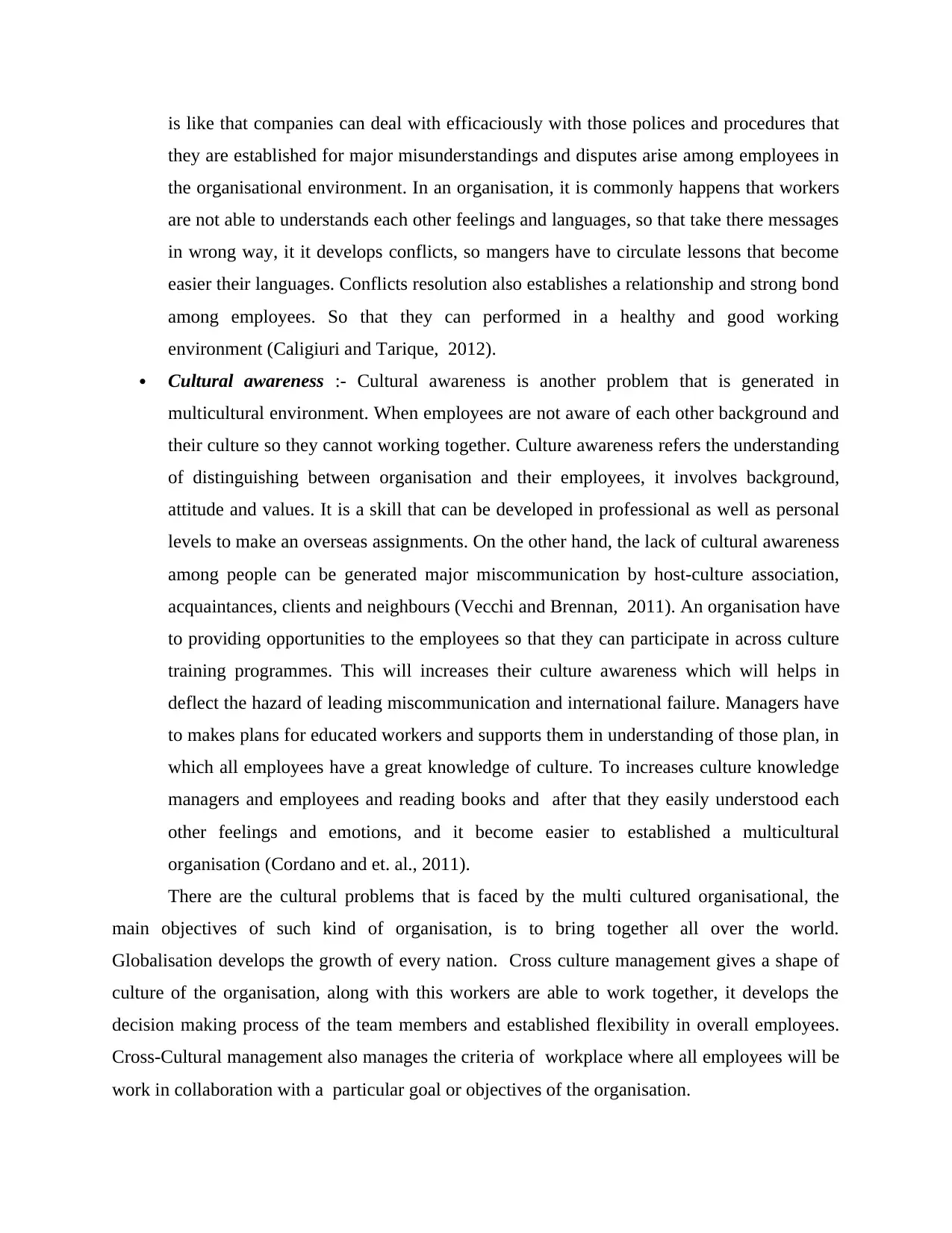
is like that companies can deal with efficaciously with those polices and procedures that
they are established for major misunderstandings and disputes arise among employees in
the organisational environment. In an organisation, it is commonly happens that workers
are not able to understands each other feelings and languages, so that take there messages
in wrong way, it it develops conflicts, so mangers have to circulate lessons that become
easier their languages. Conflicts resolution also establishes a relationship and strong bond
among employees. So that they can performed in a healthy and good working
environment (Caligiuri and Tarique, 2012).
Cultural awareness :- Cultural awareness is another problem that is generated in
multicultural environment. When employees are not aware of each other background and
their culture so they cannot working together. Culture awareness refers the understanding
of distinguishing between organisation and their employees, it involves background,
attitude and values. It is a skill that can be developed in professional as well as personal
levels to make an overseas assignments. On the other hand, the lack of cultural awareness
among people can be generated major miscommunication by host-culture association,
acquaintances, clients and neighbours (Vecchi and Brennan, 2011). An organisation have
to providing opportunities to the employees so that they can participate in across culture
training programmes. This will increases their culture awareness which will helps in
deflect the hazard of leading miscommunication and international failure. Managers have
to makes plans for educated workers and supports them in understanding of those plan, in
which all employees have a great knowledge of culture. To increases culture knowledge
managers and employees and reading books and after that they easily understood each
other feelings and emotions, and it become easier to established a multicultural
organisation (Cordano and et. al., 2011).
There are the cultural problems that is faced by the multi cultured organisational, the
main objectives of such kind of organisation, is to bring together all over the world.
Globalisation develops the growth of every nation. Cross culture management gives a shape of
culture of the organisation, along with this workers are able to work together, it develops the
decision making process of the team members and established flexibility in overall employees.
Cross-Cultural management also manages the criteria of workplace where all employees will be
work in collaboration with a particular goal or objectives of the organisation.
they are established for major misunderstandings and disputes arise among employees in
the organisational environment. In an organisation, it is commonly happens that workers
are not able to understands each other feelings and languages, so that take there messages
in wrong way, it it develops conflicts, so mangers have to circulate lessons that become
easier their languages. Conflicts resolution also establishes a relationship and strong bond
among employees. So that they can performed in a healthy and good working
environment (Caligiuri and Tarique, 2012).
Cultural awareness :- Cultural awareness is another problem that is generated in
multicultural environment. When employees are not aware of each other background and
their culture so they cannot working together. Culture awareness refers the understanding
of distinguishing between organisation and their employees, it involves background,
attitude and values. It is a skill that can be developed in professional as well as personal
levels to make an overseas assignments. On the other hand, the lack of cultural awareness
among people can be generated major miscommunication by host-culture association,
acquaintances, clients and neighbours (Vecchi and Brennan, 2011). An organisation have
to providing opportunities to the employees so that they can participate in across culture
training programmes. This will increases their culture awareness which will helps in
deflect the hazard of leading miscommunication and international failure. Managers have
to makes plans for educated workers and supports them in understanding of those plan, in
which all employees have a great knowledge of culture. To increases culture knowledge
managers and employees and reading books and after that they easily understood each
other feelings and emotions, and it become easier to established a multicultural
organisation (Cordano and et. al., 2011).
There are the cultural problems that is faced by the multi cultured organisational, the
main objectives of such kind of organisation, is to bring together all over the world.
Globalisation develops the growth of every nation. Cross culture management gives a shape of
culture of the organisation, along with this workers are able to work together, it develops the
decision making process of the team members and established flexibility in overall employees.
Cross-Cultural management also manages the criteria of workplace where all employees will be
work in collaboration with a particular goal or objectives of the organisation.
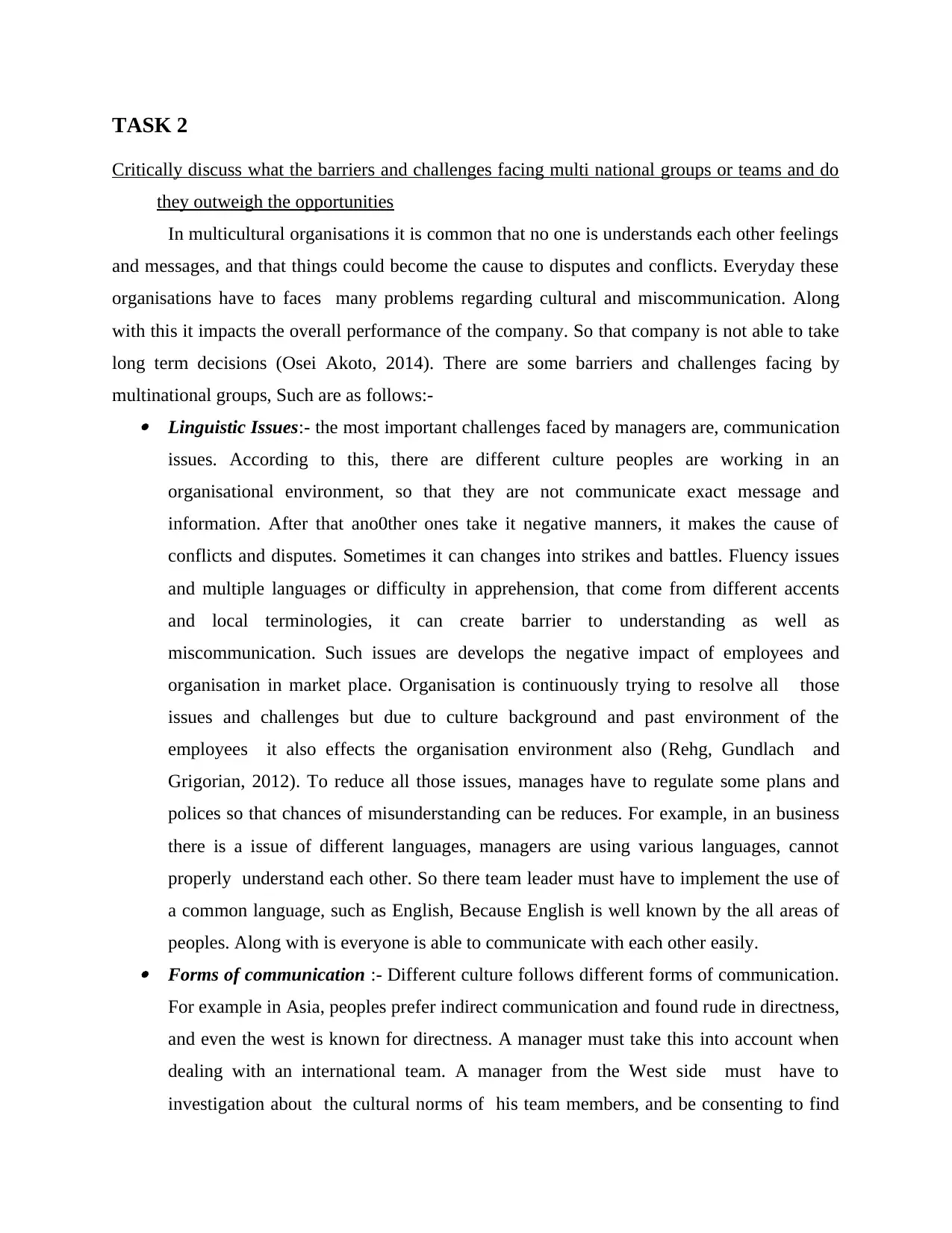
TASK 2
Critically discuss what the barriers and challenges facing multi national groups or teams and do
they outweigh the opportunities
In multicultural organisations it is common that no one is understands each other feelings
and messages, and that things could become the cause to disputes and conflicts. Everyday these
organisations have to faces many problems regarding cultural and miscommunication. Along
with this it impacts the overall performance of the company. So that company is not able to take
long term decisions (Osei Akoto, 2014). There are some barriers and challenges facing by
multinational groups, Such are as follows:- Linguistic Issues:- the most important challenges faced by managers are, communication
issues. According to this, there are different culture peoples are working in an
organisational environment, so that they are not communicate exact message and
information. After that ano0ther ones take it negative manners, it makes the cause of
conflicts and disputes. Sometimes it can changes into strikes and battles. Fluency issues
and multiple languages or difficulty in apprehension, that come from different accents
and local terminologies, it can create barrier to understanding as well as
miscommunication. Such issues are develops the negative impact of employees and
organisation in market place. Organisation is continuously trying to resolve all those
issues and challenges but due to culture background and past environment of the
employees it also effects the organisation environment also (Rehg, Gundlach and
Grigorian, 2012). To reduce all those issues, manages have to regulate some plans and
polices so that chances of misunderstanding can be reduces. For example, in an business
there is a issue of different languages, managers are using various languages, cannot
properly understand each other. So there team leader must have to implement the use of
a common language, such as English, Because English is well known by the all areas of
peoples. Along with is everyone is able to communicate with each other easily. Forms of communication :- Different culture follows different forms of communication.
For example in Asia, peoples prefer indirect communication and found rude in directness,
and even the west is known for directness. A manager must take this into account when
dealing with an international team. A manager from the West side must have to
investigation about the cultural norms of his team members, and be consenting to find
Critically discuss what the barriers and challenges facing multi national groups or teams and do
they outweigh the opportunities
In multicultural organisations it is common that no one is understands each other feelings
and messages, and that things could become the cause to disputes and conflicts. Everyday these
organisations have to faces many problems regarding cultural and miscommunication. Along
with this it impacts the overall performance of the company. So that company is not able to take
long term decisions (Osei Akoto, 2014). There are some barriers and challenges facing by
multinational groups, Such are as follows:- Linguistic Issues:- the most important challenges faced by managers are, communication
issues. According to this, there are different culture peoples are working in an
organisational environment, so that they are not communicate exact message and
information. After that ano0ther ones take it negative manners, it makes the cause of
conflicts and disputes. Sometimes it can changes into strikes and battles. Fluency issues
and multiple languages or difficulty in apprehension, that come from different accents
and local terminologies, it can create barrier to understanding as well as
miscommunication. Such issues are develops the negative impact of employees and
organisation in market place. Organisation is continuously trying to resolve all those
issues and challenges but due to culture background and past environment of the
employees it also effects the organisation environment also (Rehg, Gundlach and
Grigorian, 2012). To reduce all those issues, manages have to regulate some plans and
polices so that chances of misunderstanding can be reduces. For example, in an business
there is a issue of different languages, managers are using various languages, cannot
properly understand each other. So there team leader must have to implement the use of
a common language, such as English, Because English is well known by the all areas of
peoples. Along with is everyone is able to communicate with each other easily. Forms of communication :- Different culture follows different forms of communication.
For example in Asia, peoples prefer indirect communication and found rude in directness,
and even the west is known for directness. A manager must take this into account when
dealing with an international team. A manager from the West side must have to
investigation about the cultural norms of his team members, and be consenting to find
Paraphrase This Document
Need a fresh take? Get an instant paraphrase of this document with our AI Paraphraser
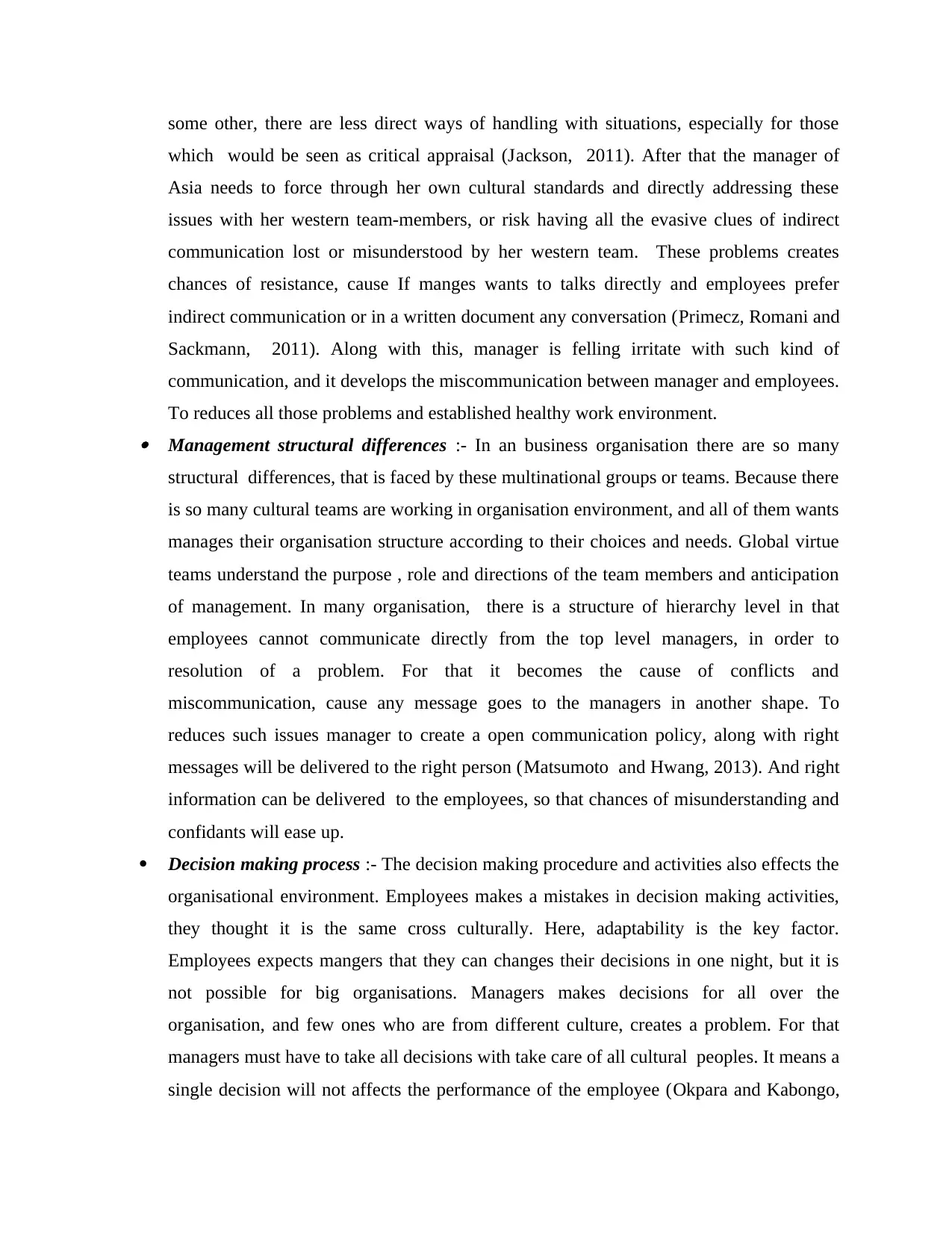
some other, there are less direct ways of handling with situations, especially for those
which would be seen as critical appraisal (Jackson, 2011). After that the manager of
Asia needs to force through her own cultural standards and directly addressing these
issues with her western team-members, or risk having all the evasive clues of indirect
communication lost or misunderstood by her western team. These problems creates
chances of resistance, cause If manges wants to talks directly and employees prefer
indirect communication or in a written document any conversation (Primecz, Romani and
Sackmann, 2011). Along with this, manager is felling irritate with such kind of
communication, and it develops the miscommunication between manager and employees.
To reduces all those problems and established healthy work environment. Management structural differences :- In an business organisation there are so many
structural differences, that is faced by these multinational groups or teams. Because there
is so many cultural teams are working in organisation environment, and all of them wants
manages their organisation structure according to their choices and needs. Global virtue
teams understand the purpose , role and directions of the team members and anticipation
of management. In many organisation, there is a structure of hierarchy level in that
employees cannot communicate directly from the top level managers, in order to
resolution of a problem. For that it becomes the cause of conflicts and
miscommunication, cause any message goes to the managers in another shape. To
reduces such issues manager to create a open communication policy, along with right
messages will be delivered to the right person (Matsumoto and Hwang, 2013). And right
information can be delivered to the employees, so that chances of misunderstanding and
confidants will ease up.
Decision making process :- The decision making procedure and activities also effects the
organisational environment. Employees makes a mistakes in decision making activities,
they thought it is the same cross culturally. Here, adaptability is the key factor.
Employees expects mangers that they can changes their decisions in one night, but it is
not possible for big organisations. Managers makes decisions for all over the
organisation, and few ones who are from different culture, creates a problem. For that
managers must have to take all decisions with take care of all cultural peoples. It means a
single decision will not affects the performance of the employee (Okpara and Kabongo,
which would be seen as critical appraisal (Jackson, 2011). After that the manager of
Asia needs to force through her own cultural standards and directly addressing these
issues with her western team-members, or risk having all the evasive clues of indirect
communication lost or misunderstood by her western team. These problems creates
chances of resistance, cause If manges wants to talks directly and employees prefer
indirect communication or in a written document any conversation (Primecz, Romani and
Sackmann, 2011). Along with this, manager is felling irritate with such kind of
communication, and it develops the miscommunication between manager and employees.
To reduces all those problems and established healthy work environment. Management structural differences :- In an business organisation there are so many
structural differences, that is faced by these multinational groups or teams. Because there
is so many cultural teams are working in organisation environment, and all of them wants
manages their organisation structure according to their choices and needs. Global virtue
teams understand the purpose , role and directions of the team members and anticipation
of management. In many organisation, there is a structure of hierarchy level in that
employees cannot communicate directly from the top level managers, in order to
resolution of a problem. For that it becomes the cause of conflicts and
miscommunication, cause any message goes to the managers in another shape. To
reduces such issues manager to create a open communication policy, along with right
messages will be delivered to the right person (Matsumoto and Hwang, 2013). And right
information can be delivered to the employees, so that chances of misunderstanding and
confidants will ease up.
Decision making process :- The decision making procedure and activities also effects the
organisational environment. Employees makes a mistakes in decision making activities,
they thought it is the same cross culturally. Here, adaptability is the key factor.
Employees expects mangers that they can changes their decisions in one night, but it is
not possible for big organisations. Managers makes decisions for all over the
organisation, and few ones who are from different culture, creates a problem. For that
managers must have to take all decisions with take care of all cultural peoples. It means a
single decision will not affects the performance of the employee (Okpara and Kabongo,
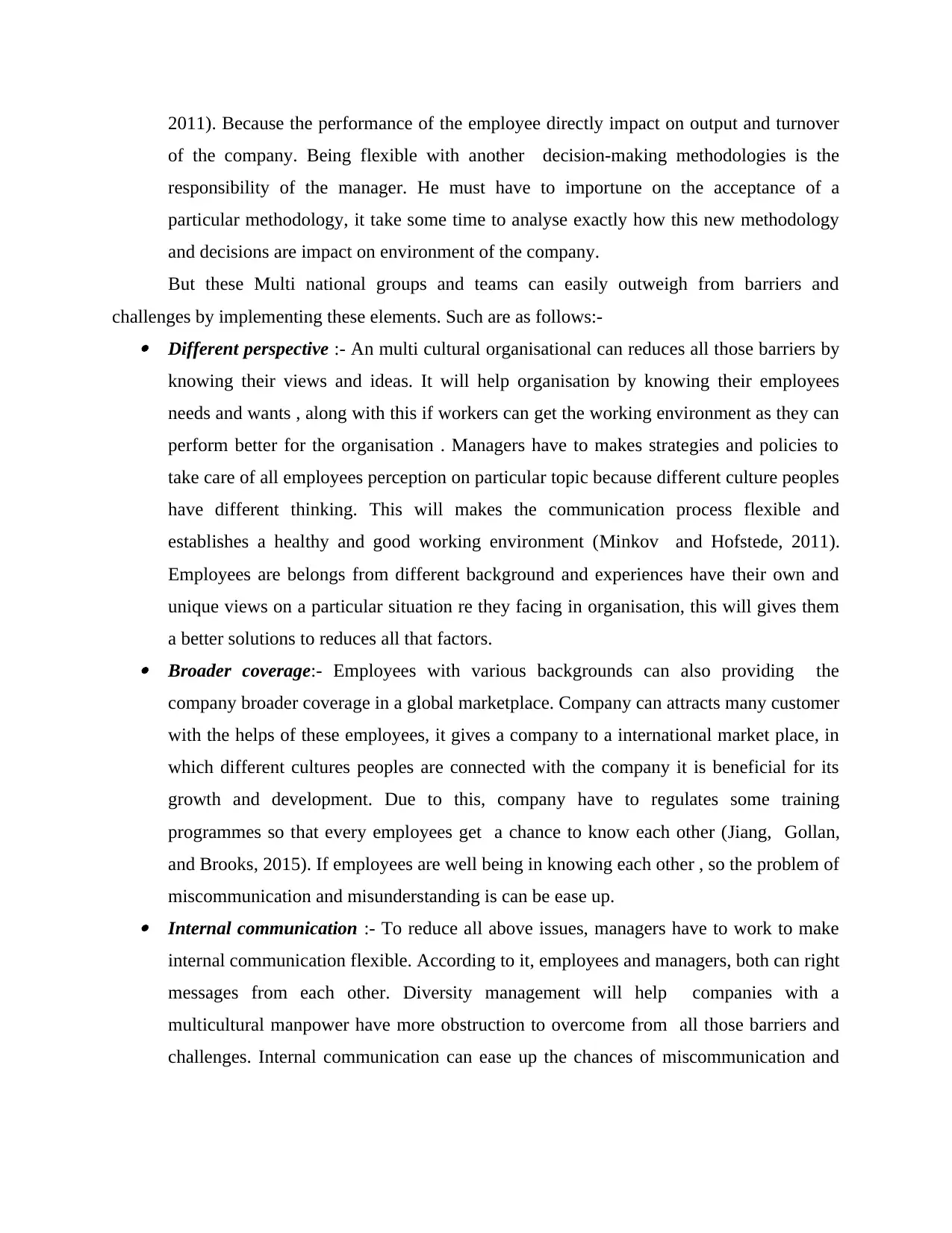
2011). Because the performance of the employee directly impact on output and turnover
of the company. Being flexible with another decision-making methodologies is the
responsibility of the manager. He must have to importune on the acceptance of a
particular methodology, it take some time to analyse exactly how this new methodology
and decisions are impact on environment of the company.
But these Multi national groups and teams can easily outweigh from barriers and
challenges by implementing these elements. Such are as follows:- Different perspective :- An multi cultural organisational can reduces all those barriers by
knowing their views and ideas. It will help organisation by knowing their employees
needs and wants , along with this if workers can get the working environment as they can
perform better for the organisation . Managers have to makes strategies and policies to
take care of all employees perception on particular topic because different culture peoples
have different thinking. This will makes the communication process flexible and
establishes a healthy and good working environment (Minkov and Hofstede, 2011).
Employees are belongs from different background and experiences have their own and
unique views on a particular situation re they facing in organisation, this will gives them
a better solutions to reduces all that factors. Broader coverage:- Employees with various backgrounds can also providing the
company broader coverage in a global marketplace. Company can attracts many customer
with the helps of these employees, it gives a company to a international market place, in
which different cultures peoples are connected with the company it is beneficial for its
growth and development. Due to this, company have to regulates some training
programmes so that every employees get a chance to know each other (Jiang, Gollan,
and Brooks, 2015). If employees are well being in knowing each other , so the problem of
miscommunication and misunderstanding is can be ease up. Internal communication :- To reduce all above issues, managers have to work to make
internal communication flexible. According to it, employees and managers, both can right
messages from each other. Diversity management will help companies with a
multicultural manpower have more obstruction to overcome from all those barriers and
challenges. Internal communication can ease up the chances of miscommunication and
of the company. Being flexible with another decision-making methodologies is the
responsibility of the manager. He must have to importune on the acceptance of a
particular methodology, it take some time to analyse exactly how this new methodology
and decisions are impact on environment of the company.
But these Multi national groups and teams can easily outweigh from barriers and
challenges by implementing these elements. Such are as follows:- Different perspective :- An multi cultural organisational can reduces all those barriers by
knowing their views and ideas. It will help organisation by knowing their employees
needs and wants , along with this if workers can get the working environment as they can
perform better for the organisation . Managers have to makes strategies and policies to
take care of all employees perception on particular topic because different culture peoples
have different thinking. This will makes the communication process flexible and
establishes a healthy and good working environment (Minkov and Hofstede, 2011).
Employees are belongs from different background and experiences have their own and
unique views on a particular situation re they facing in organisation, this will gives them
a better solutions to reduces all that factors. Broader coverage:- Employees with various backgrounds can also providing the
company broader coverage in a global marketplace. Company can attracts many customer
with the helps of these employees, it gives a company to a international market place, in
which different cultures peoples are connected with the company it is beneficial for its
growth and development. Due to this, company have to regulates some training
programmes so that every employees get a chance to know each other (Jiang, Gollan,
and Brooks, 2015). If employees are well being in knowing each other , so the problem of
miscommunication and misunderstanding is can be ease up. Internal communication :- To reduce all above issues, managers have to work to make
internal communication flexible. According to it, employees and managers, both can right
messages from each other. Diversity management will help companies with a
multicultural manpower have more obstruction to overcome from all those barriers and
challenges. Internal communication can ease up the chances of miscommunication and
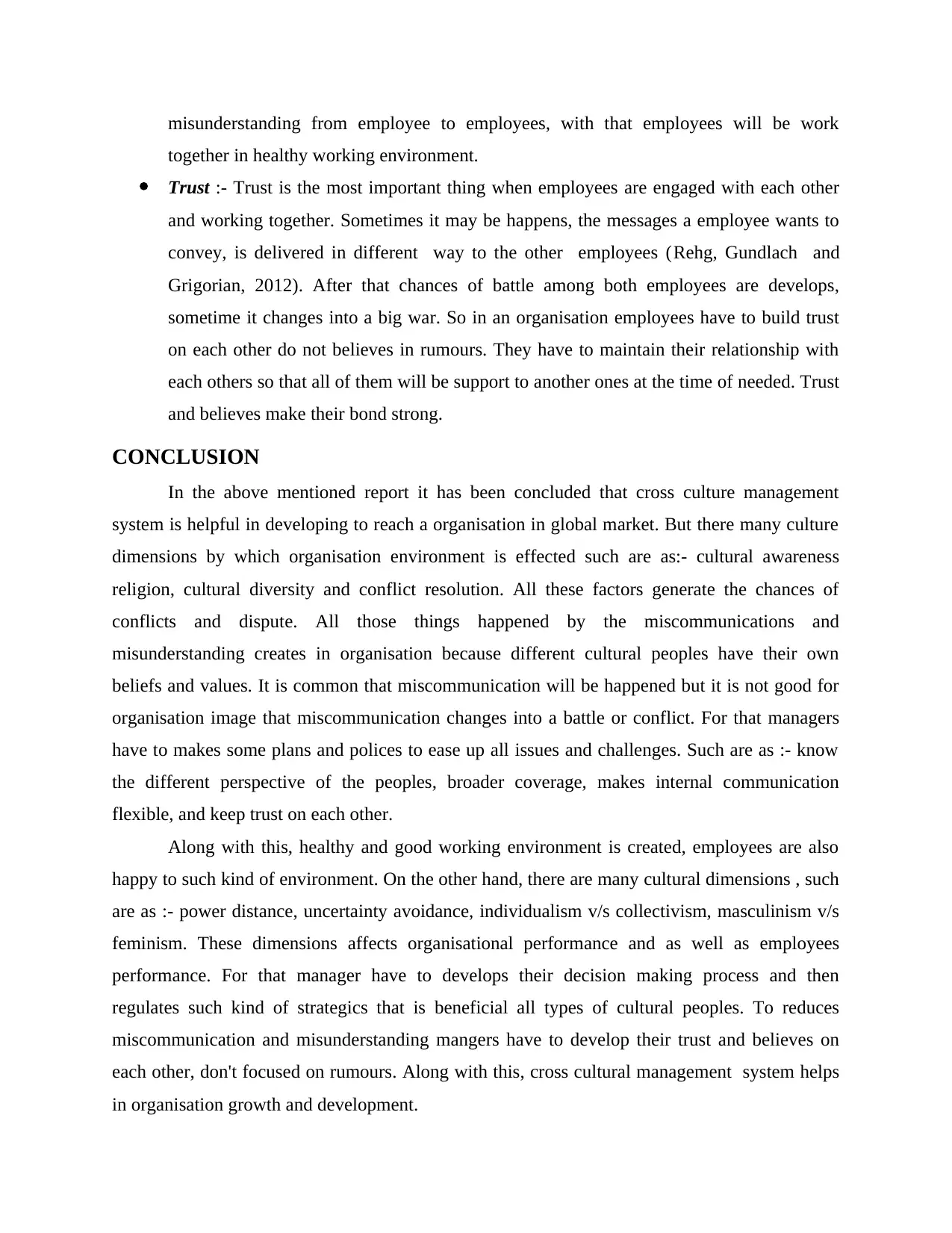
misunderstanding from employee to employees, with that employees will be work
together in healthy working environment.
Trust :- Trust is the most important thing when employees are engaged with each other
and working together. Sometimes it may be happens, the messages a employee wants to
convey, is delivered in different way to the other employees (Rehg, Gundlach and
Grigorian, 2012). After that chances of battle among both employees are develops,
sometime it changes into a big war. So in an organisation employees have to build trust
on each other do not believes in rumours. They have to maintain their relationship with
each others so that all of them will be support to another ones at the time of needed. Trust
and believes make their bond strong.
CONCLUSION
In the above mentioned report it has been concluded that cross culture management
system is helpful in developing to reach a organisation in global market. But there many culture
dimensions by which organisation environment is effected such are as:- cultural awareness
religion, cultural diversity and conflict resolution. All these factors generate the chances of
conflicts and dispute. All those things happened by the miscommunications and
misunderstanding creates in organisation because different cultural peoples have their own
beliefs and values. It is common that miscommunication will be happened but it is not good for
organisation image that miscommunication changes into a battle or conflict. For that managers
have to makes some plans and polices to ease up all issues and challenges. Such are as :- know
the different perspective of the peoples, broader coverage, makes internal communication
flexible, and keep trust on each other.
Along with this, healthy and good working environment is created, employees are also
happy to such kind of environment. On the other hand, there are many cultural dimensions , such
are as :- power distance, uncertainty avoidance, individualism v/s collectivism, masculinism v/s
feminism. These dimensions affects organisational performance and as well as employees
performance. For that manager have to develops their decision making process and then
regulates such kind of strategics that is beneficial all types of cultural peoples. To reduces
miscommunication and misunderstanding mangers have to develop their trust and believes on
each other, don't focused on rumours. Along with this, cross cultural management system helps
in organisation growth and development.
together in healthy working environment.
Trust :- Trust is the most important thing when employees are engaged with each other
and working together. Sometimes it may be happens, the messages a employee wants to
convey, is delivered in different way to the other employees (Rehg, Gundlach and
Grigorian, 2012). After that chances of battle among both employees are develops,
sometime it changes into a big war. So in an organisation employees have to build trust
on each other do not believes in rumours. They have to maintain their relationship with
each others so that all of them will be support to another ones at the time of needed. Trust
and believes make their bond strong.
CONCLUSION
In the above mentioned report it has been concluded that cross culture management
system is helpful in developing to reach a organisation in global market. But there many culture
dimensions by which organisation environment is effected such are as:- cultural awareness
religion, cultural diversity and conflict resolution. All these factors generate the chances of
conflicts and dispute. All those things happened by the miscommunications and
misunderstanding creates in organisation because different cultural peoples have their own
beliefs and values. It is common that miscommunication will be happened but it is not good for
organisation image that miscommunication changes into a battle or conflict. For that managers
have to makes some plans and polices to ease up all issues and challenges. Such are as :- know
the different perspective of the peoples, broader coverage, makes internal communication
flexible, and keep trust on each other.
Along with this, healthy and good working environment is created, employees are also
happy to such kind of environment. On the other hand, there are many cultural dimensions , such
are as :- power distance, uncertainty avoidance, individualism v/s collectivism, masculinism v/s
feminism. These dimensions affects organisational performance and as well as employees
performance. For that manager have to develops their decision making process and then
regulates such kind of strategics that is beneficial all types of cultural peoples. To reduces
miscommunication and misunderstanding mangers have to develop their trust and believes on
each other, don't focused on rumours. Along with this, cross cultural management system helps
in organisation growth and development.
Secure Best Marks with AI Grader
Need help grading? Try our AI Grader for instant feedback on your assignments.
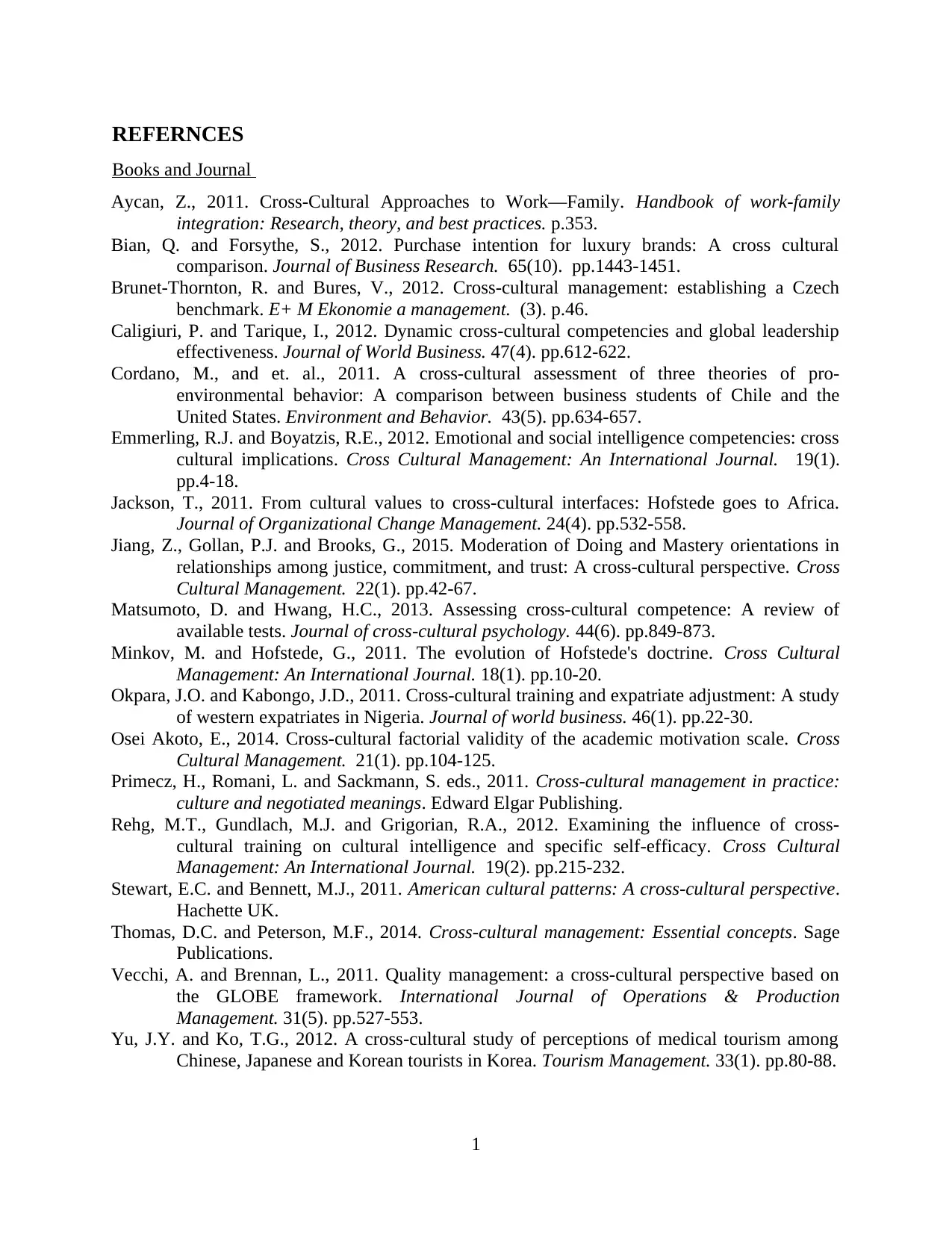
REFERNCES
Books and Journal
Aycan, Z., 2011. Cross-Cultural Approaches to Work—Family. Handbook of work-family
integration: Research, theory, and best practices. p.353.
Bian, Q. and Forsythe, S., 2012. Purchase intention for luxury brands: A cross cultural
comparison. Journal of Business Research. 65(10). pp.1443-1451.
Brunet-Thornton, R. and Bures, V., 2012. Cross-cultural management: establishing a Czech
benchmark. E+ M Ekonomie a management. (3). p.46.
Caligiuri, P. and Tarique, I., 2012. Dynamic cross-cultural competencies and global leadership
effectiveness. Journal of World Business. 47(4). pp.612-622.
Cordano, M., and et. al., 2011. A cross-cultural assessment of three theories of pro-
environmental behavior: A comparison between business students of Chile and the
United States. Environment and Behavior. 43(5). pp.634-657.
Emmerling, R.J. and Boyatzis, R.E., 2012. Emotional and social intelligence competencies: cross
cultural implications. Cross Cultural Management: An International Journal. 19(1).
pp.4-18.
Jackson, T., 2011. From cultural values to cross-cultural interfaces: Hofstede goes to Africa.
Journal of Organizational Change Management. 24(4). pp.532-558.
Jiang, Z., Gollan, P.J. and Brooks, G., 2015. Moderation of Doing and Mastery orientations in
relationships among justice, commitment, and trust: A cross-cultural perspective. Cross
Cultural Management. 22(1). pp.42-67.
Matsumoto, D. and Hwang, H.C., 2013. Assessing cross-cultural competence: A review of
available tests. Journal of cross-cultural psychology. 44(6). pp.849-873.
Minkov, M. and Hofstede, G., 2011. The evolution of Hofstede's doctrine. Cross Cultural
Management: An International Journal. 18(1). pp.10-20.
Okpara, J.O. and Kabongo, J.D., 2011. Cross-cultural training and expatriate adjustment: A study
of western expatriates in Nigeria. Journal of world business. 46(1). pp.22-30.
Osei Akoto, E., 2014. Cross-cultural factorial validity of the academic motivation scale. Cross
Cultural Management. 21(1). pp.104-125.
Primecz, H., Romani, L. and Sackmann, S. eds., 2011. Cross-cultural management in practice:
culture and negotiated meanings. Edward Elgar Publishing.
Rehg, M.T., Gundlach, M.J. and Grigorian, R.A., 2012. Examining the influence of cross-
cultural training on cultural intelligence and specific self-efficacy. Cross Cultural
Management: An International Journal. 19(2). pp.215-232.
Stewart, E.C. and Bennett, M.J., 2011. American cultural patterns: A cross-cultural perspective.
Hachette UK.
Thomas, D.C. and Peterson, M.F., 2014. Cross-cultural management: Essential concepts. Sage
Publications.
Vecchi, A. and Brennan, L., 2011. Quality management: a cross-cultural perspective based on
the GLOBE framework. International Journal of Operations & Production
Management. 31(5). pp.527-553.
Yu, J.Y. and Ko, T.G., 2012. A cross-cultural study of perceptions of medical tourism among
Chinese, Japanese and Korean tourists in Korea. Tourism Management. 33(1). pp.80-88.
1
Books and Journal
Aycan, Z., 2011. Cross-Cultural Approaches to Work—Family. Handbook of work-family
integration: Research, theory, and best practices. p.353.
Bian, Q. and Forsythe, S., 2012. Purchase intention for luxury brands: A cross cultural
comparison. Journal of Business Research. 65(10). pp.1443-1451.
Brunet-Thornton, R. and Bures, V., 2012. Cross-cultural management: establishing a Czech
benchmark. E+ M Ekonomie a management. (3). p.46.
Caligiuri, P. and Tarique, I., 2012. Dynamic cross-cultural competencies and global leadership
effectiveness. Journal of World Business. 47(4). pp.612-622.
Cordano, M., and et. al., 2011. A cross-cultural assessment of three theories of pro-
environmental behavior: A comparison between business students of Chile and the
United States. Environment and Behavior. 43(5). pp.634-657.
Emmerling, R.J. and Boyatzis, R.E., 2012. Emotional and social intelligence competencies: cross
cultural implications. Cross Cultural Management: An International Journal. 19(1).
pp.4-18.
Jackson, T., 2011. From cultural values to cross-cultural interfaces: Hofstede goes to Africa.
Journal of Organizational Change Management. 24(4). pp.532-558.
Jiang, Z., Gollan, P.J. and Brooks, G., 2015. Moderation of Doing and Mastery orientations in
relationships among justice, commitment, and trust: A cross-cultural perspective. Cross
Cultural Management. 22(1). pp.42-67.
Matsumoto, D. and Hwang, H.C., 2013. Assessing cross-cultural competence: A review of
available tests. Journal of cross-cultural psychology. 44(6). pp.849-873.
Minkov, M. and Hofstede, G., 2011. The evolution of Hofstede's doctrine. Cross Cultural
Management: An International Journal. 18(1). pp.10-20.
Okpara, J.O. and Kabongo, J.D., 2011. Cross-cultural training and expatriate adjustment: A study
of western expatriates in Nigeria. Journal of world business. 46(1). pp.22-30.
Osei Akoto, E., 2014. Cross-cultural factorial validity of the academic motivation scale. Cross
Cultural Management. 21(1). pp.104-125.
Primecz, H., Romani, L. and Sackmann, S. eds., 2011. Cross-cultural management in practice:
culture and negotiated meanings. Edward Elgar Publishing.
Rehg, M.T., Gundlach, M.J. and Grigorian, R.A., 2012. Examining the influence of cross-
cultural training on cultural intelligence and specific self-efficacy. Cross Cultural
Management: An International Journal. 19(2). pp.215-232.
Stewart, E.C. and Bennett, M.J., 2011. American cultural patterns: A cross-cultural perspective.
Hachette UK.
Thomas, D.C. and Peterson, M.F., 2014. Cross-cultural management: Essential concepts. Sage
Publications.
Vecchi, A. and Brennan, L., 2011. Quality management: a cross-cultural perspective based on
the GLOBE framework. International Journal of Operations & Production
Management. 31(5). pp.527-553.
Yu, J.Y. and Ko, T.G., 2012. A cross-cultural study of perceptions of medical tourism among
Chinese, Japanese and Korean tourists in Korea. Tourism Management. 33(1). pp.80-88.
1

Online
From conflict to cooperation; Building cross cultural teams. 2017. [Online]. Available through:
<https://www.business.com/articles/from-conflict-to-cooperation-building-stronger-
cross-cultural-teams/>. [Accessed on 18th April 2017].
How to Build Trust on Your Cross-Cultural Team. 2016. [Online]. Avaialble through:
<https://hbr.org/2016/06/how-to-build-trust-on-your-cross-cultural-team>. [Accessed on
18th April 2017].
2016/06/how-to-build-
trust-on-your-cross-
cultural-team>.
[accessed on 18th April
2017].
2
From conflict to cooperation; Building cross cultural teams. 2017. [Online]. Available through:
<https://www.business.com/articles/from-conflict-to-cooperation-building-stronger-
cross-cultural-teams/>. [Accessed on 18th April 2017].
How to Build Trust on Your Cross-Cultural Team. 2016. [Online]. Avaialble through:
<https://hbr.org/2016/06/how-to-build-trust-on-your-cross-cultural-team>. [Accessed on
18th April 2017].
2016/06/how-to-build-
trust-on-your-cross-
cultural-team>.
[accessed on 18th April
2017].
2
1 out of 12
Related Documents
Your All-in-One AI-Powered Toolkit for Academic Success.
+13062052269
info@desklib.com
Available 24*7 on WhatsApp / Email
![[object Object]](/_next/static/media/star-bottom.7253800d.svg)
Unlock your academic potential
© 2024 | Zucol Services PVT LTD | All rights reserved.





